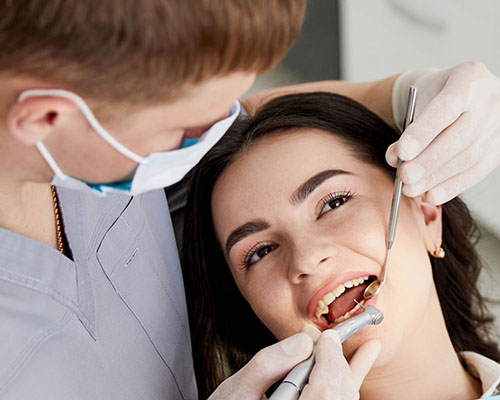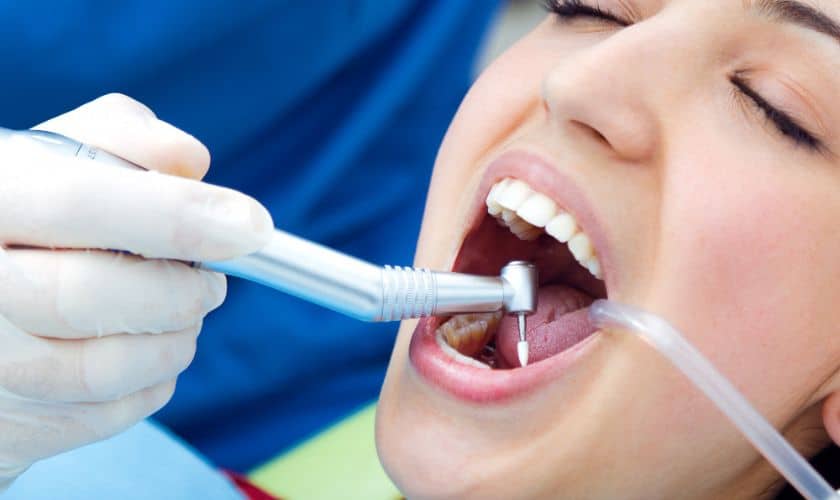Transform Your Smile with Porcelain Crowns: A Comprehensive Overview
Are you self-conscious about your teeth? Do you hide your smile in photos or avoid social situations because of your dental insecurities? It’s time to end that and transform your smile with porcelain crowns. Not only do they provide a natural-looking solution for damaged, discolored, or misshapen teeth, but they also offer long-lasting durability and functionality. In this comprehensive overview, we’ll delve into everything you need to know about porcelain crowns – from the benefits and candidacy requirements to the procedure process and aftercare tips – so you can make an informed decision about improving your oral health and confidence. Let’s get started!
What are Porcelain Crowns?

- Porcelain crowns are one of the most popular dental restoration options available today. Crowns are a restoration that replaces part or all of a tooth’s enamel with porcelain. Crowns provide a long-term solution to problems with teeth and can be used on both front and back teeth.
- Crowns come in many different shapes and sizes and can be custom-made to fit your particular needs. For example, they can be colored to match your natural teeth or filled with transparent materials like glass or plastic so that you can see the underlying structure of your teeth.
- Crowns are often recommended for patients who have suffered significant damage to their teeth due to decay, fracture, or other trauma. Crowns offer a permanent solution to these problems, and they typically require less time and effort than traditional dentistry procedures like root canal therapy or fillings.
- Contact your dentist for more information if you want to use porcelain crowns as a dental restoration option. Consider scheduling a consultation to learn more about this unique restoration option’s various benefits and features.
Types of Porcelain Crowns
Porcelain crowns are an incredibly popular way to improve your smile. They come in various shapes and sizes and can be customized to fit your teeth perfectly. They are also durable and removable, so you can maintain your smile no matter what life throws.
- There are two main types of these crowns: fixed and removable. Fixed porcelain crowns are permanently attached to the teeth and cannot be removed without special tools. Removable porcelain crowns can be replaced with new ones as they wear down.
- Fixed porcelain crowns are more expensive than removable ones but are usually more durable and last longer. They’re also easier to keep clean since they don’t need to be removed for cleaning.
- Fixed porcelain crowns are the best option if you’re looking for a permanent solution for your smile enhancement needs. If you need clarification on whether a fixed or removable porcelain crown is right, speak with your dentist about your options.
How Do They Work?
Porcelain crowns are dental restorations that are used to restore and strengthen damaged or discolored teeth. They are custom-made to fit over the affected tooth, providing protection and an aesthetically pleasing appearance. Here’s an overview of how porcelain crowns are typically placed:
- Consultation and Examination: The first step is to schedule an appointment with a dentist. During the consultation, your dentist will examine your teeth and determine if a porcelain crown is the appropriate treatment option for your specific dental issue.
- Tooth Preparation: If a porcelain crown is deemed suitable, your dentist will begin the process by preparing the affected tooth. This typically involves removing a small amount of the tooth’s outer structure to create space for the crown. The amount of tooth structure removed depends on the extent of the damage and the specific treatment plan.
- Impression: Once the tooth is prepared, your dentist will take an impression of the tooth and the surrounding teeth. This impression serves as a mold for the dental laboratory to create a custom-fit crown that matches your natural teeth in size, shape, and color.
- Temporary Crown: While the permanent crown is being fabricated, your dentist will place a temporary crown on the prepared tooth to protect it. This temporary crown is usually made of acrylic and is not as durable as the permanent one.
- Crown Placement: Once the permanent crown is ready, you will return to your dentist’s office for the final placement. Your dentist will remove the temporary crown and check the fit and color of the permanent crown. If necessary, adjustments may be made at this stage to ensure a proper fit.
- Cementation: Once the fit is confirmed, your dentist will use a dental adhesive or cement to bond the porcelain crown onto the prepared tooth. The crown is carefully positioned and secured in place.
- Bite and Appearance Check: After the crown is cemented, your dentist will check your bite to ensure that it is properly aligned with your other teeth. They will also examine the crown’s appearance, making any necessary adjustments to ensure it blends seamlessly with your natural teeth.
- Post-Treatment Care: Your dentist will provide you with instructions on how to care for your new porcelain crown. It’s important to maintain good oral hygiene by brushing and flossing regularly and scheduling regular dental check-ups.
Remember that the procedure may vary depending on the specific case and the practices of your dentist. It’s always best to consult with a dental professional to determine the most appropriate treatment plan for your individual needs.
Source : SitDownPerspective
The advantages of using a these crowns include the following:
- Porcelain Crowns Are More Durable Than Other Types of Restorations:
- One major advantage of using a porcelain crown over other dental restoration materials is that it will last longer and be less likely to break or chip.
- Porcelain Crowns Are Less Likely To Leak:
- Another advantage of using a porcelain crown over other dental restoration materials is that it is less likely to leak. The adhesive used to bind the crown pieces together is strong and resistant to water damage. Some people even report never having to go back for maintenance on their porcelain crowns!
Why Choose a Porcelain Crown?
Choosing a porcelain crown as a dental restoration option offers several benefits. Here are some reasons why porcelain crowns are a popular choice:
- Aesthetics: Porcelain crowns provide excellent aesthetics due to their natural appearance. The material closely mimics the color, texture, and translucency of natural teeth, resulting in a seamless blend with your existing smile. This makes porcelain crowns an ideal option for visible areas of the mouth, such as the front teeth.
- Durability: Porcelain crowns are highly durable and can withstand normal biting and chewing forces. They are known for their strength and resilience, providing long-term protection to weakened or damaged teeth. With proper care, porcelain crowns can last for many years, offering a reliable solution for dental restoration.
- Biocompatibility: Porcelain is a biocompatible material, meaning it is well-tolerated by the body. It is non-toxic and does not cause allergic reactions or gum irritations, making it a safe choice for most individuals. Porcelain crowns interact well with the surrounding oral tissues, promoting overall oral health.
- Stain Resistance: Porcelain has excellent stain-resistant properties, allowing the crown to maintain its natural appearance over time. Unlike other materials, porcelain is highly resistant to discoloration caused by common staining agents such as coffee, tea, or tobacco. This ensures that your smile remains bright and vibrant.
- Customization: Porcelain crowns are customized to match the size, shape, and color of your natural teeth. Dental professionals work closely with dental laboratories to create crowns that blend seamlessly with your existing dentition, providing a natural and aesthetically pleasing result. This customization ensures that the crown enhances your smile and complements your facial features.
- Conservative Preparation: Porcelain crowns require minimal removal of tooth structure compared to other restorations like full dental crowns or dental implants. The conservative preparation helps preserve as much of the natural tooth as possible while still providing the necessary support and protection. This is a valuable aspect as it helps maintain the integrity of the remaining tooth structure.
In conclusion, porcelain crowns offer numerous advantages such as aesthetic appeal, durability, biocompatibility, stain resistance, customization, and conservative preparation. Consulting with a dental professional will help determine if a porcelain crown is the best option for your specific dental needs.
If you are unhappy with how your smile looks, now is the time to do something about it. Porcelain crowns offer a wide variety of facial improvements that can transform your appearance for the better and improve your emotional well-being. In this comprehensive blog, we have tried to outline everything you need to know about Porcelain crowns to make an informed decision about whether or not porcelain crowns are right for you. We hope that our information was helpful and that you will give us a call if you would like to schedule a consultation so that we can discuss your specific needs in more detail.




